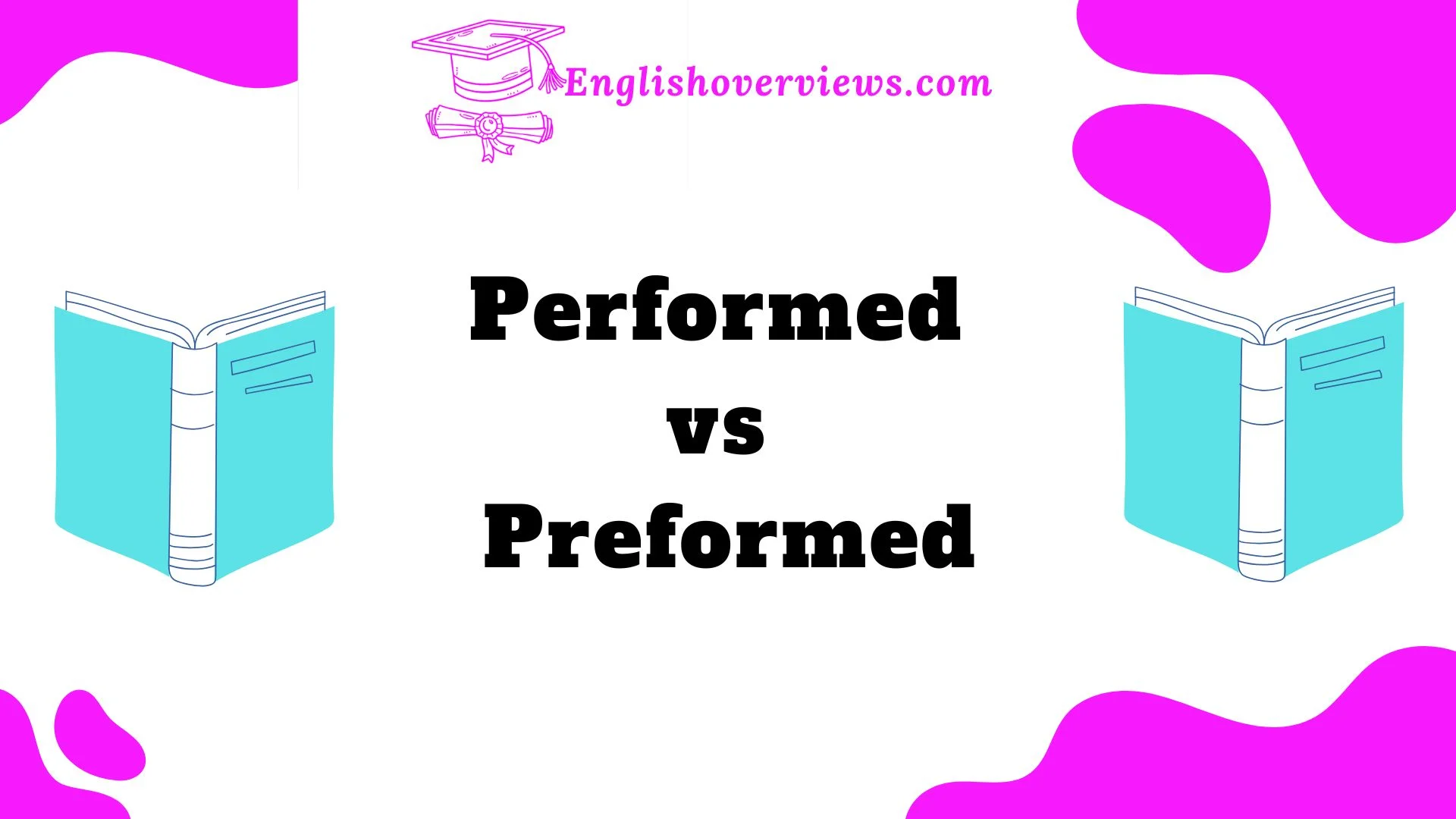Language is full of subtle differences that can often confuse even the most experienced writers and speakers. Two such words “performed” vs “preformed” often cause a bit of trouble, especially since their meanings and uses overlap in some contexts.
But don’t worry! In this guide, we’re going to take a deep dive into these two words and help you clearly understand when to use each one.
Whether you’re crafting a professional report, preparing for an exam, or simply trying to sound more fluent, mastering these terms will give you a strong command of your language.
We’ll explore the definitions of performed and preformed, how to use them correctly, and share real-world examples so you can confidently distinguish between the two.
Along the way, we’ll also touch on synonyms, idioms, and interesting facts that will enrich your understanding of these terms. So, whether you’re curious about the differences or just want to be sure you’re using the right word, you’ve come to the right place.
Performed vs Preformed: The Basics
Understanding the differences between performed and preformed is essential. While they might seem similar, they are used in very different contexts.
What Does “Performed” Mean?
Performed is the past tense of the verb “perform”. It refers to carrying out an action, completing a task, or showcasing a talent or skill. In many cases, performed suggests something done with effort or a degree of success.
Here are a few examples of performed in action:
- In a concert: “The musician performed a beautiful piece on the piano.”
- In a test or study: “The team performed an in-depth analysis of the data.”
- In a social setting: “She performed well during the interview.”
So, when you use performed, you’re typically talking about the execution or completion of something, whether that’s an activity, an action, or a demonstration of talent.
What Does “Preformed” Mean?
On the other hand, preformed is a term usually used in manufacturing, construction, or any context where something is shaped or made in advance for later use. It’s not about completing an action; it’s about preparing or creating something before it’s needed.
Here are some examples of preformed:
- In construction: “The preformed metal beams were ready for assembly.”
- In art: “The artist preformed the clay into molds before firing it in the kiln.”
- In packaging: “The company uses preformed plastic containers to speed up production.”
So, preformed is about shaping or preparing something before it is used or assembled.
How to Use “Performed” in Sentences

Using performed in a sentence is fairly simple, but let’s break down some contexts where it really shines.
Formal vs Informal Uses of Performed
In formal settings, performed often refers to carrying out tasks or actions with precision or efficiency. Here’s how you might use it:
- In a business context: “The team performed the audit successfully.”
- In a medical setting: “The surgeon performed the operation with exceptional skill.”
However, performed is equally useful in informal situations, especially when referring to talent or ability:
- In entertainment: “She performed an incredible solo at the concert.”
- In personal achievements: “He performed really well on his final exam.”
Key Takeaway: Whether formal or informal, performed always carries the idea of completing or carrying out an action usually with a level of competence or skill.
How to Ask Questions Using “Performed”

Asking questions with performed can be a little tricky, but once you understand its core meaning, it becomes intuitive.
Here are a few common question structures:
- “How did you perform on the exam?”
- “What actions were performed during the presentation?”
- “Why was the task performed that way?”
These questions seek to understand how something was done, what was done, or why it was performed in a certain way.
Example Situations
Imagine you’re at a meeting where a task was recently completed. You might ask:
- “How did the team perform during the project?” (Here, you’re asking about the outcome.)
- “What specific actions were performed to meet the deadline?” (This asks for details about the task.)
Pro Tip: Using performed in these questions typically implies a sense of assessment, evaluation, or review.
Understanding “Perform”: More Than Just Action

Now, let’s take a step back and understand perform the verb that gives rise to performed.
Perform means to do, execute, or act out something. However, it has a broader meaning, too. It’s not just about finishing tasks; it’s also about showcasing talent, abilities, and behaviors.
Meaning of Perform
- To execute or carry out an action: “The pilot performed a difficult maneuver.”
- To showcase talent or skills: “She performed a beautiful ballet routine.”
- To behave in a specific way: “He performed well under pressure.”
Examples:
- In music: “The orchestra performed Beethoven’s Ninth Symphony.”
- In sports: “The athlete performed a flawless dive.”
Key Insight: When someone is said to have performed, it often implies they did so with a certain degree of skill or competence, whether in a public setting or in private.
The Concept of “Preform”: A Shaping Process
Unlike performed, preform is more about preparation and shaping something before it’s used.
What Does “Preform” Mean?
Preform refers to shaping, creating, or forming something before it’s used for its final purpose. This term is common in industries like construction, manufacturing, or crafting.
Examples of “Preform”:
- In manufacturing: “The team preformed the parts before assembly to save time.”
- In construction: “The preformed concrete slabs were used to quickly assemble the building.”
Here, preform refers to the process of preparing something before it becomes part of a final product.
Key Differences Between Performed and Preformed

The primary difference between performed and preformed lies in action versus preparation. Performed refers to executing something or completing an action, while preformed refers to shaping or preparing something in advance.
| Performed | Preformed |
| Refers to actions that are completed | Refers to preparing or shaping something ahead of time |
| Common in social, artistic, or professional contexts | Mostly used in industrial or manufacturing contexts |
| Implies execution or presentation of skills or tasks | Implies an earlier process or shaping before final use |
7. Interesting Points About Performed vs Preformed
While performed and preformed seem distinct, there are occasions where their meanings might overlap. For instance, in some manufacturing or assembly settings, something preformed can also be performed as part of a process. However, it’s important to note the underlying differences in focus performed emphasizes action, while preformed emphasizes preparation.
Idioms Related to “Perform”

Perform is widely used in idiomatic expressions, especially when referring to personal abilities, success, or expectations.
Common Idioms:
- “Perform a miracle”: Meaning to achieve something seemingly impossible.
- “Perform to the best of one’s ability”: To give your maximum effort.
- “All in a day’s work”: Used to suggest that a task is routine, even if it’s impressive.
Quote: “Success is the sum of small efforts, repeated day in and day out.” Robert Collier
These idioms emphasize the idea of performing with effort, skill, or in exceptional circumstances.
Word Formation of “Perform”
Perform is a versatile word with many derivatives that are useful in different contexts.
| Word Form | Meaning | Example Sentence |
| Perform (verb) | To carry out an action | “He performed a fantastic play.” |
| Performance (noun) | The act of performing, an event | “Her performance was nothing short of amazing.” |
| Performer (noun) | A person who performs | “The performer took a bow after the show.” |
| Performative (adj) | Relating to the act of performing | “The performative speech moved the audience deeply.” |
Synonyms for “Perform”
Synonyms for perform help diversify language and add variety to writing.
- Execute: “She executed the dance moves perfectly.”
- Carry out: “He carried out the plan successfully.”
- Accomplish: “They accomplished their goal on time.”
- Undertake: “She undertook the task with enthusiasm.”
Real-World Example:
In a project management scenario, you might use:
- “The team executed the strategy well.”
- “They carried out the analysis with great detail.”
How to Use “Performed” in Different Contexts

In Literature
In literature, performed is used to describe how characters act or carry out actions within a narrative. Whether it’s in drama or fiction, performed signifies the completion of an event or action within the storyline.
Example: “The hero performed acts of bravery in the face of adversity.”
In Society
Performing in society can refer to social roles, personal achievements, or public displays. From politics to entertainment, performing often involves the exhibition of skills, values, or ideals.
Example: “He performed his duties as president with great dignity.”
FAQs
- What’s the difference between “performed” and “preformed”?
- Performed refers to carrying out or completing an action, while preformed refers to shaping or preparing something in advance.
- Can “performed” be used for physical objects?
- Generally, performed is used for actions or tasks, not physical objects, which would be more accurately described as preformed if shaped or created ahead of time.
- Is “preformed” only for things made in advance?
- Yes, preformed refers to something that has been shaped or prepared beforehand for a specific purpose.
- Why is the distinction between these words important?
- The distinction helps clarify the context whether you’re talking about the execution of a task or the preparation of something before it is used.

English Overviews is a resourceful website dedicated to providing valuable content related to grammar and vocabulary. Muhammad Haroon has made notable contributions, sharing insights on various subjects, including WordPress themes and plugins. The primary goal of the site is to help users improve their English language skills effectively.











